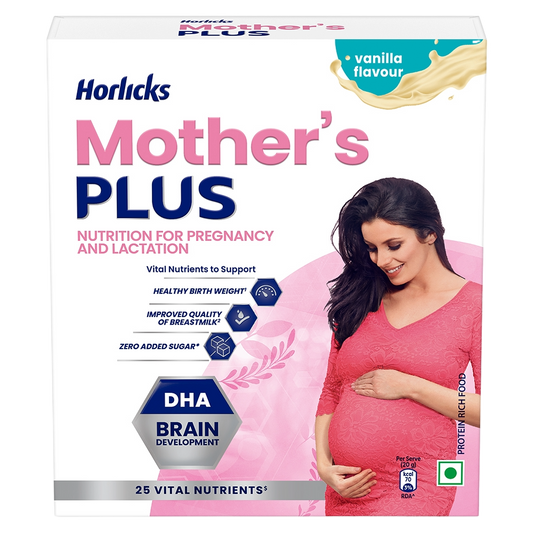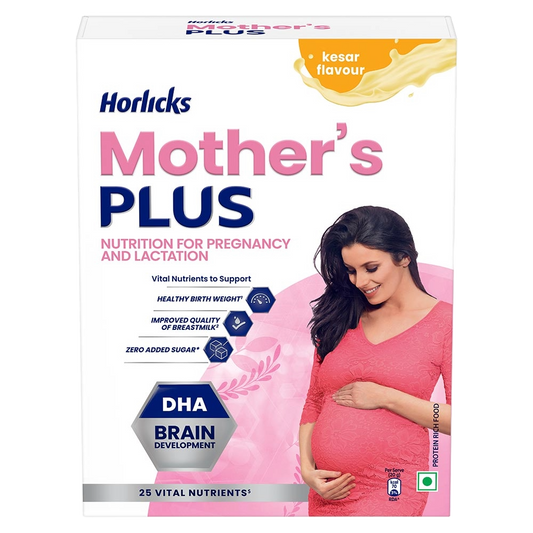The optimal intake of nutritional food often holds the key to a healthy pregnancy. It is important for expectant mothers to consume the right nutrients in the right quantities to ensure their health and that of their baby. This nutrition comes in the form of calcium, iron, and a variety of vitamins. Additionally, protein is an essential component that pregnant mothers must ensure to consume optimally.

Why Do You Need Protein During Pregnancy?
Protein plays a crucial role for the baby - especially during the second and third trimesters.1 It provides amino acids for the development of bones, cells, and muscles. The right intake of protein during pregnancy can also reduce neonatal complications2.
Along with that, it is important that women gain a certain amount of weight during pregnancy. For those with an average weight, that amount would be 10 - 14 kgs (avg 12 kg). 3 Protein plays a big role here. It facilitates weight gain as well as the development of muscles.
However, pregnant mothers on a low-protein diet tend to gain less weight and, in turn, their babies may have lower weight at birth.4 Inadequate protein in the foetal stage could also lead to chronic health problems later in life.5
How Much Protein Should You Consume?
Your daily protein intake is determined, in large part, by the amount of weight you need to gain as well as the regular requirements you face during pregnancy.
Consider an average weight gain of 12 kg during pregnancy. For this, the World Health Organisation recommends a Protein gain of 597 g (range 497 g to 696 g). Further, NNC states that in the first trimester of pregnancy, the Recommended Dietary Intake (RDI) of protein for pregnant women is 46 g per day (0.75 g/kg/day). In the second and third trimesters, it is 60 g per day (1.00 g/kg/day)7
- Eggs are an excellent source of protein, vitamins, and minerals.
- Fish and lean chicken are other sources of protein. However, avoid fish with high mercury content as it can harm your baby’s nervous system. Instead, go for low-mercury options, like, pomfret, or shrimp.8,9
- Increasing the protein intake need not be a challenge for vegetarian mothers. You can gorge on protein-rich fruits and vegetables during your pregnancy. Bananas carry loads of nutrients and are especially rich in protein.10
- Dairy products like milk and curd are packed with protein and calcium. Soya is another good option.11
- As a vegetarian mom-to-be, you may already be consuming sprouts and lentils. Another easy way to raise your protein intake is by simply increasing the portions you eat. Just one-and-a-half cups of lentils will give you an extra 25 g of protein.
- Brown rice and beans are great additions to your diet.
- Nuts and dry fruit bring an additional serving of protein and provide for a nutritious and healthy midday snack.12
- You could also benefit from high-protein drinks like Horlicks Mother’s Plus.
Here Is A Quick Overview Of The Protein Content Of Some Common Foods:13
| Food |
Item |
Protein Content
|
| Meat |
Chicken leg (skinless) |
19.4 g |
| Fish |
White pomfret |
19.0 g |
| Eggs |
|
|
| Lentils |
|
|
|
Milk and milk products
|
Paneer |
18.9 g |
| NOTE: The protein content is given per 100g portion. |

Getting The Balance Right
When pregnant, it is important to get the right nutrition, right calories, and gain the right amount of weight. Balance is everything so you must take necessary steps to ensure it is maintained. One such step is maintaining a nutrition journal that can help you track your eating habits. It will ensure you make up for any shortfalls in your daily meals.
Along with that, it is also advisable to consult a nutritionist. Adapting to a new diet during pregnancy may not be easy and you may need to be extra careful. But the proper health of you and your baby will make it worth all the effort.
The author is Neha Chandna, who has been a practicing dietitian since the last eight years. The views, opinions and recommendations expressed in this article are solely those of the author and intended as an educational aid. Please consult your doctor for professional advice concerning specific health/medical matters.









